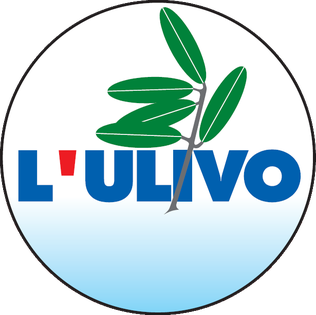Related Research Articles

The House of Freedoms was a major centre-right political and electoral alliance in Italy, led by Silvio Berlusconi.

Romano Antonio Prodi is an Italian politician, economist, academic, civil servant and manager who served as the tenth president of the European Commission from 1999 to 2004. He served twice as Prime Minister of Italy, first from 18 May 1996 to 21 October 1998 and then from 17 May 2006 to 8 May 2008. He is considered the founder of the Italian centre-left and one of the most prominent and iconic figures of the so-called Second Republic. Prodi is often nicknamed Il Professore due to his academic career.

The Democrats of the Left was a social-democratic political party in Italy.

The Olive Tree was a denomination used for several successive centre-left political and electoral alliances of Italian political parties from 1995 to 2007.

Democracy is Freedom – The Daisy, commonly known simply as The Daisy, was a centrist political party in Italy. The party was formed from the merger of three parties within the centre-left coalition: the Italian People's Party, The Democrats and Italian Renewal. The party president and leader was Francesco Rutelli, former mayor of Rome and prime ministerial candidate during the 2001 general election for The Olive Tree coalition, within which The Daisy electoral list won 14.5% of the national vote.

The Italian Republican Party is a liberal and social-liberal political party in Italy. Founded in 1895, the PRI is the oldest political party still active in Italy.

The Union was an heterogenous centre-left political and electoral alliance of political parties in Italy. The Union was the direct heir of The Olive Tree coalition which represented the centre-left in the 1996 and 2001 general elections. However, The Union also included parties of the radical left, which were not affiliated with The Olive Tree. The Union was led by Romano Prodi, Prime Minister of Italy from May 2006 to May 2008, and former President of the European Commission. Collapsing in the wake of the 2008 Italian political crisis, the alliance was succeeded by the current-day centre-left coalition.

The Democratic Party of the Left was a democratic socialist and social democratic political party in Italy. Founded in February 1991 as the post-communist evolution of the Italian Communist Party, the party was the largest in the Alliance of Progressives and The Olive Tree coalitions. In February 1998, the party merged with minor parties to form Democrats of the Left.

The Democratic Alliance was a social-liberal political party in Italy.

The Democrats were a centrist and social-liberal political party in Italy.

Italian Renewal was a centrist, liberal political party in Italy.

The Network, whose complete name was Movement for Democracy – The Network, was a political party in Italy led by Leoluca Orlando.

The Prodi II Cabinet was the cabinet of the government of Italy from 17 May 2006 to 8 May 2008, a total of 722 days, or 1 year, 11 months and 21 days. The 59th cabinet of the Italian Republic, it was the only cabinet of the XV Legislature.

The Prodi I Cabinet was the 53rd cabinet of the Italian Republic. It held office from 18 May 1996 until 21 October 1998.

The Segni Pact, officially called National Rebirth Pact, was a Christian-democratic, centrist and liberal political party in Italy, named after Mario Segni.

The Pole of Freedoms was a centre-right political and electoral alliance in Italy, launched at the 1994 general election by Silvio Berlusconi. Its counterpart in central and southern Italy was the Pole of Good Government.
The Clover was a centrist coalition of Italian political parties.

The Pole for Freedoms was a centre-right political and electoral alliance in Italy, which was active from 1996 to 2000. It included Forza Italia (FI), the National Alliance (AN), Union of the Centre (UdC), Christian Democratic Centre (CCD), United Christian Democrats (CDD), and Pannella–Sgarbi List.

Antonio Maccanico was an Italian constitutional specialist and social liberal politician, who served in various capacities in the parliament and federal administrations of Italy.
The centre-left coalition is an alliance of political parties in Italy active, under several forms and names, since 1995 when The Olive Tree was formed under the leadership of Romano Prodi. The centre-left coalition ruled the country for more than thirteen years between 1996 and 2021.
References
- ↑ Gabriella Fanello Marcucci (2003). Archivio del Parlamento, delle istituzioni, dei partiti e movimenti politici: documenti sonori in digitale. Rubbettino Editore. p. 180. ISBN 978-88-498-0701-1.
- ↑ Alan Friedman (27 February 1996). "Berlusconi Looks Like the Loser in Dini's Jump into Politics". The New York Times. Paris. Retrieved 30 November 2013.
- ↑ James J. Newell; Martin Bull (1997). "Party Organisations and Alliance in Italy in the 19902: A Revolution of Sorts". In Martin Bull; Martin Rhodes (eds.). Crisis and Transition in Italian Politics. Routledge. pp. 102–103. ISBN 978-1-135-22274-1.
- ↑ Tom Lansford (2013). Political Handbook of the World 2013. SAGE Publications. p. 714. ISBN 978-1-4522-5825-6.
- ↑ Catherine Moury (2010). "Common manifestoes and coalition governance: How political leaders lost the window of opportunity". In Andrea Mammone; Giuseppe A. Veltri (eds.). Italy Today: The Sick Man of Europe. Routledge. p. 37. ISBN 978-1-135-16494-2.
- ↑ Catherine Moury (2013). Coalition Government and Party Mandate: How Coalition Agreements Constrain Ministerial Action. Routledge. p. 101. ISBN 978-1-136-18910-4.